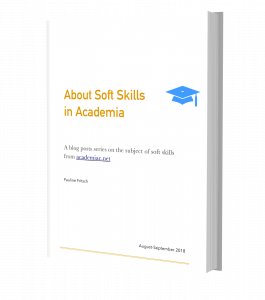In the previous article I listed where one could find soft skills training in academia, and the resulting list is actually pretty long. It made me realize that there are tons of possibilities. No surprise that I was so confused when I started my PhD in a new country…
Update May 2019: I’ve now made a resource for PhD students and postdocs in Switzerland listing Graduate Centers, Career Centers and Soft Skills Programs in Swiss Universities 🇨🇭
I feel like there is a real lack of appropriate communication about what PhD students and postdocs can do other than “classical” research tasks (like reading, writing, conducting experiments, listening to and giving talks) and in order to develop other skills (transferable skills). I am sure there still are some high-level academics who don’t want to understand the value of soft skills for academia. However, I believe that now most academics see the interests in such training, especially for skills like time management, project management or scientific communication. Still, in my case, it is by chance that I registered to a doctoral program which happened to provide such transferable skills workshops.
I was the first student in my lab to take the time to really look at all the workshops offered by this program and to attend a first one without knowing whether it would be good or not. Luckily for me it revealed being amazingly helpful! But as the years passed I heard about many other programs or events which could have helped me as well.
You’re probably receiving emails advertising such programs and events? I received tons! But 1) we get so many emails that sometimes even good ones look like spam, 2) when no one in your lab seems to pay attention to those emails and everyone just bury their heads in their experiments, you feel like you should just do the same and not give a true look at them… Sure, universities’ websites can help too. But most of the time, it was only when someone directly told me about a program that I understood its interest, included for things which I had seen in emails before.
Therefore, at some point I created a simple Word document with a few useful links to give to new PhD students joining our lab. Do you have something like this in your lab? It actually takes less time to make than one might expect 🙂
Sure, there are tons of such things online or advertised in emails, but I believe that it is only by welcoming direct discussion about such programs and events within institutes, within labs, and with all academics’ levels (especially with supervisors) that new students can find the training and mental support they need.
Indeed my doctoral program provided me with technical skills, soft skills and mental support. I would have never benefited as much from it without the openness and understanding of my supervisor. But while this program was getting quite popular for students in my lab, I met several supervisors and students from other labs in our institute who didn’t really know about it…
I hope communication about such training programs and events would be improved and more welcomed by all levels of academics in order to address the mental health crisis in academia (Evans et al., 2018).
NB: Careful though, one may not want to force a student to attend a specific training workshop or event. If we feel forced to do something, we’re most likely not going to get the best out of it.
Have a look at the next and last article of this series about soft skills, we look at the question do senior scientists acknowledge the importance of early soft skills training? Here a teaser: the answer is yes!!





0 Comments
Trackbacks/Pingbacks